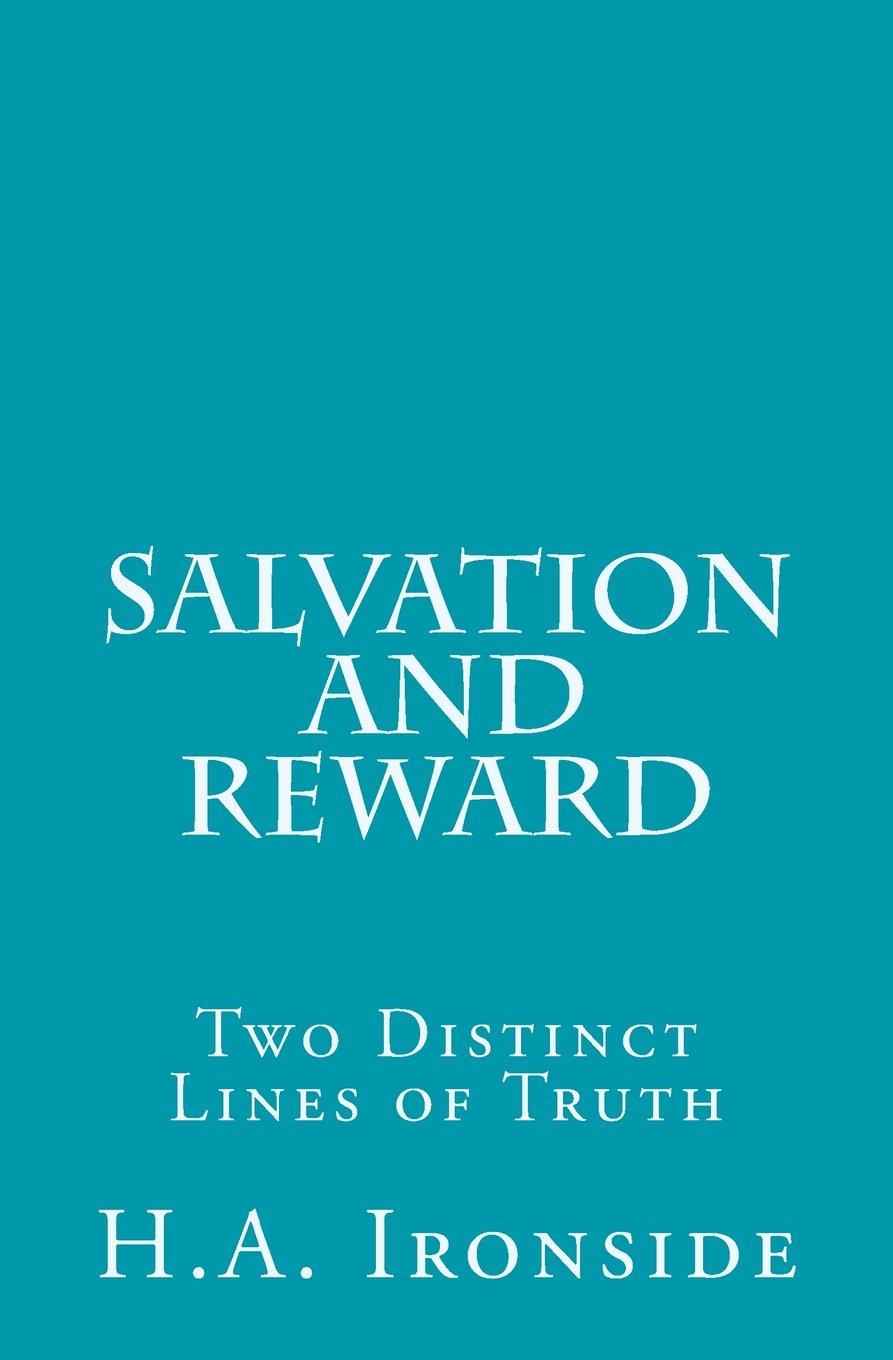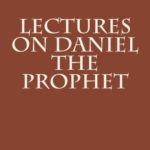Description
Salvation and Reward
Two Distinct Lines of Truth
by
H. A. Ironside
2015
Salvation and Reward
There are two lines of truth very clearly distinguished in Scripture which are often confounded by those who do not read discriminatingly and who are not given to “rightly dividing the Word of Truth.” I refer to the subjects, “Salvation by Grace” and “Reward for Service.” To the casual reader of the New Testament it sometimes seems as though there is apparent contradiction, when in one place we are distinctly told that we are saved by grace alone, apart from works, whereas, in another, we are just as clearly told that we are to be rewarded according to our works. It is only as we learn the mind of the Spirit in regard to these two very different lines of teaching that the soul is set free from self-occupation and given to know the blessedness of peace with God, on the ground of pure grace, thus leaving one free to serve in the happy knowledge that the sin question is forever settled, but that service is the outflow of a grateful heart to the One who has redeemed us, and yet that He, in His wondrous loving-kindness, takes note of everything we do for Him, and will reward accordingly.
At the very outset it may be well to link together a number of scriptures which present these various phases of truth. In Romans 4:3-5 we read:
“For what saith the Scripture? Abraham believed God, and it was counted unto him for righteousness.
Now to him that worketh is the reward not reckoned of grace, but of debt.
But to him that worketh not, but believeth on Him that justifieth the ungodly, his faith is counted for righteousness.”
Here we learn that, just as Abraham was accounted righteous before God on the ground of faith alone, so to-day we who believe are justified from all our ungodliness the moment we trust in Christ. Were it otherwise, were it necessary that we should prove ourselves worthy in order to be saved, our salvation would not be of grace, for we would be putting God in our debt. If salvation is a reward for service, then, clearly, God would owe it to the one who faithfully performed whatever service He demanded, to save that soul in exchange for the good deeds done. This, of course, would not be grace. How different is the principle on which we are justified! It is “to him that worketh not, but believeth on Him that justifieth the ungodly.” Nothing can be clearer than this, and yet how many have stumbled over it.
Now let us link with this Ephesians 2:8-10:
“For by grace are ye saved through faith; and that not of yourselves: it is the gift of God: not of works, lest any man should boast.
For we are His workmanship, created in Christ Jesus unto good works, which God hath before ordained that we should walk in them.”
Here again we have the precious truth manifested, that salvation is altogether of grace through faith; that is, through believing the testimony that God has given. “Faith cometh by hearing, and hearing by the Word of God.” Therefore even the faith by which we are saved is in no sense of ourselves; it is God’s gift, for it is not until He gives a testimony that we can believe; but when that testimony comes home to us in the power of the Holy Spirit and we put our trust in it, we are saved. This leaves no place whatever for works as a procuring cause of salvation. Were it otherwise, there would be ground for boasting. If I could obtain a place in Heaven because of my devotion to Christ down here, I would have good reason to congratulate myself for all Eternity upon that very devotion which had led to so blessed a result. But no saint in Heaven will ever give himself credit for anything he has ever done. The song of all the redeemed will be, “Unto Him that loveth us and hath washed us from our sins in His own blood, be glory and honor, dominion, and power and might forever and ever.” And yet, in the tenth verse of our passage, we are just as distinctly told that we are created in Christ Jesus unto good works; that is, we did not enter the new creation through good works, but having been brought into this new creation by faith, it is now incumbent upon us, as obedient children, to walk in righteousness before God, living in good works which God has pre-appointed to characterize those who are saved.
In 1 Corinthians, chapter 3, the apostle tells us of the testing which evidently takes place at the judgment-seat of Christ. Notice verses 11-15:
“For other foundation can no man lay than is laid, which is Jesus Christ.
Now if any man build upon this foundation gold, silver, precious stones, wood, hay, stubble;
Every man’s work shall be made manifest: for the day shall declare it, because it shall be revealed by fire, and the fire shall try every man’s work of what sort it is.
If any man’s work abide which he hath built thereupon, he shall receive a reward.
If any man’s work shall be burned, he shall suffer loss: but he himself shall be saved; yet so as by fire.”
According to this passage, every believer is a workman building upon the foundation already laid, which is Jesus Christ. His work may be according to the Spirit, likened unto gold, silver and costly stones, or according to the flesh, and likened unto wood, hay, stubble. The day of manifestation will reveal what is of God and what is not. For that work which abides reward will be given, but that which does not abide will disappear in the cleansing fires of judgment, and for the wasted time the believer will suffer loss. His salvation, however, is not in question. He would not appear at this scene of testing if he were not already saved. The destruction of his works does not touch this question. Though everything should be burned up, he, himself, shall be saved, yet so as by fire.
Another helpful passage in this connection is found in Hebrews 10:35, 36:
“Cast not away therefore your confidence, which hath great recompence of reward.
For ye have need of patience, that, after ye have done the will of God, ye might receive the promise.”
It is to persons already saved that the exhortation comes: “Cast not away therefore your confidence, which hath great recompence of reward.” This same principle was true in olden times, for we read in chapter 11, of Israel’s great leader, that,
“By faith Moses, when he was come to years, refused to be called the son of Pharaoh’s daughter;
Choosing rather to suffer affliction with the people of God, than to enjoy the pleasures of sin for a season;
Esteeming the reproach of Christ greater riches than the treasures in Egypt; for he had respect unto the recompence of the reward.”
There can be no question but that Moses was already a quickened soul, a child of God, in whom justifying faith dwelt, when he made his great renunciation and gave up a throne for a wilderness tent, for his eye discerned and his heart was set upon the reward in eternal ages, reserved for the one who put the testimony of God before personal comfort and convenience.
A kindred verse is found in Second John, verse 8:
“Look to yourselves, that we lose not those things which we have wrought, but that we receive a full reward.”
No believer can lose his salvation, for that is not in his keeping. We are told this distinctly in John 10:27-29:
“My sheep hear My voice, and I know them, and they follow Me:
And I give unto them eternal life; and they shall never perish, neither shall any man pluck them out of My hand.
My Father, which gave them Me, is greater than all; and no man is able to pluck them out of My Father’s hand.”
But we may lose at least a portion of our reward.
There are two verses in the Book of Revelation which fit together beautifully in this connection. In chapter 3:11 the Lord announces His near return, saying:
“Behold, I come quickly: hold that fast which thou hast, that no man take thy crown.”
In chapter 22:12 He says:
“And, behold, I come quickly; and my reward is with Me, to give every man according as his work shall be.”
These two verses make one thing very clear, which forms the basis of a most interesting and helpful study for our encouragement and warning. The reward spoken of in the latter passage is evidently synonymous with the crown of the other.
Any one can readily see, by turning to the word “crown” in a critical or analytical Bible Concordance, that there are two words so translated in the New Testament. One is literally “diadem,” and refers to the regal circlet worn by a king or emperor. This is the word used in Rev. 12, 13 and 19. In the first instance the Great Red Dragon, “that old serpent, which is the devil and Satan,” is seen wearing seven diadems. He is the prince of this world. Then we see the wild-beast of chapter 13—the coming prince of Dan. 9—wearing ten diadems. This is Satan’s Man, who will some day arise and will accept the offer that our blessed Lord indignantly spurned when shown all the kingdoms of earth and promised their rulership if He would worship the Adversary. In chapter 19 the descending Lord Himself comes to take the kingdom, and “upon His head are many diadems.” He is to rule as King of kings and Lord of lords.
The other word—”stephanos,” from which the name “Stephen” comes—is, literally, a victor’s wreath. It refers to the chaplet of laurel or other leaves placed upon the brow of the triumphant athlete in the games of old, or the golden band worn upon the head of the victorious general as he marched in triumph through the city amid the plaudits of the people. Subject kings wore a crown of this character in contrast to the imperial diadem. When the soldiery mocked Jesus they put upon Him a crown—or,stephanos—of thorns, the fruit of the curse. Yet He was indeed the Victor, even in the hour of His apparent defeat, and He is now “crowned with glory and honor,” as He sits at the right hand of the Majesty in the heavens.
“His be the Victor’s Name
Who fought the fight alone,
Triumphant saints no honor claim,
His conquest was their own.
By weakness and defeat
He won the meed and crown,
Trod all our foes beneath His feet
By being trodden down.”
And He, the Overcomer whom the Father Himself has crowned, is the Judge of the contests in which His saints are engaged, and will in due time sit upon the Bema—the judgment-seat—and give to the overcomers the crowns they have won in the conflict with sin. We have a list of the heroes of faith who have fought and overcome in Heb. 11, and in chapter 12 we read,
“Wherefore seeing we also are compassed about with so great a cloud of witnesses, let us lay aside every weight and the sin which doth so easily beset us, and let us run with patience the race that is set before us, looking unto Jesus, the author and finisher of faith, who for the joy that was set before Him, endured the cross, despising the shame, and is set down at the right hand of the throne of God” (verses 1, 2).
“Bless, bless the Conqueror slain;
Slain in His victory;
He lived, He died, He lives again,
For thee, His Church, for thee.”
We likewise are running a race and for us as for Him there is a crown at the end. It is of this the apostle Paul writes when he speaks of





Reviews
There are no reviews yet.